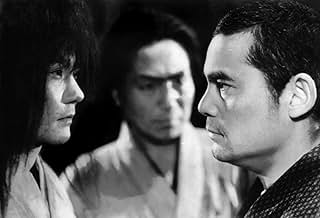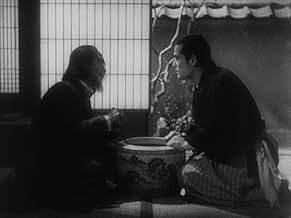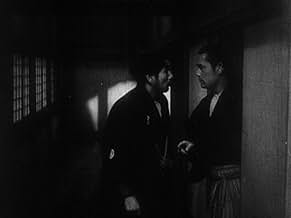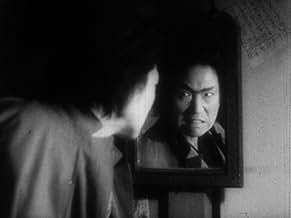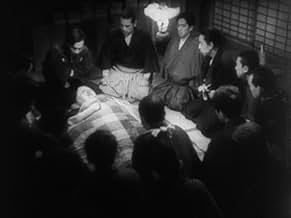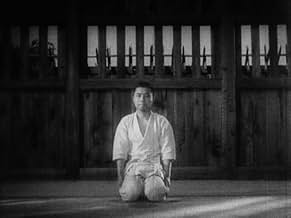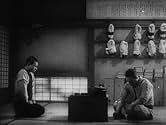Kô Ishida
- Daisuburo Hidarimonji
- (as Ko Ishida)
Osman Yusuf
- American Sailor
- (as Osman Yusef)
- Director
- Writers
- All cast & crew
- Production, box office & more at IMDbPro
Featured reviews
I ended my recent review of "Sanshiro Sugata" by a sneaky remark. I alleged that the lead actor Susumu Fujita was no Toshiro Mifune... and I wish I could have found a more pleasant way to put it.
Now, let me reformulate. As true as it might be that Fujita doesn't have the same range, charisma or 'magnitude' than international icon Mifune, it is as unfair as comparing Harry Carey Jr. To John Wayne. And after that weird and rather corny opening, his appearance was quite a welcome sight. Indeed, something about the first minutes of the sequel of "Sanshiro Siguta" (which I prefer to refer to as "The Legend of the Great Judo") really set me off. The drunken Yankee sailor (played by Osman Yusuf!) kept blabbering some American slang with a rather convincing accent but the rickshaw was playing it it (no pun intended) as if he was playing in a Mac Senntt film.
Fujita's entrance changes the tone. He looks stern, menacing, and oddly intimidating. The confrontation did not leave much for suspense; it was obvious that for his opening fight scene would be an easy win. Still, whatever is wrong with the sequel has nothing to do with Fujita, who delivers a memorable performance as the young, idealistic and well-meaning martial arts student. It is a good thing because Siguta is in such a perpetual self-doubt that his quest could have taken a trilogy. I doubt it would have helped Kurosawa's career and I am sure he was more than glad to change this after the war. Therefore, at the end Siguta reaches his personal nirvana after Kurosawa stretched his arc as far as he could.
For the rest, it takes a while for the film to find its tone as it keeps being entangled in the necessity to make a point about the art of judo's superiority over boxing, the decadent export of US. Apparently Kurosawa was somewhat forced into making the film a propaganda by underlining without any attempt at subtitlity that boxing incarnates a failure of civilization that is so opposed to the quest of Judo... but for that, Americans are barely present and are replaced by a Japanese manager who's a caricatural sellout. While the film is by no means mediocre, it is not the master's finest hour and you can tell that if it wasn't for that propaganda subtext, it could have made for a better experience. It doesn't help that the image and sound quality (obviously not restored) make it difficult to appreciate.
Now the film is slightly better when it makes connections with the previous one and shows Sigita struggling to forgive himself for the death of Yono's father (played by Shimura in the first film) and when all of sudden, two strange long-haired characters who look like coming from a fantasy horror film and with expressionnist shadows decide to come to revenge their brothers, leading to a climax set in the snow-covered mountains. Iy is so magnificent you'd think it was borrowed from another film... and come way too late in the film.
Overall, it is a decent film but, the result is so beneath the standards of excellence of Kurosawa and of intelligence, that it will probably satisfy some history buffs looking for expressions of propaganda Japanese film and naturally the completists. Apart from that, it is a warmup before Toshiro Mifune who was certainly the muse Kurosawa needed (with Shimura being the touchstone)
Now, let me reformulate. As true as it might be that Fujita doesn't have the same range, charisma or 'magnitude' than international icon Mifune, it is as unfair as comparing Harry Carey Jr. To John Wayne. And after that weird and rather corny opening, his appearance was quite a welcome sight. Indeed, something about the first minutes of the sequel of "Sanshiro Siguta" (which I prefer to refer to as "The Legend of the Great Judo") really set me off. The drunken Yankee sailor (played by Osman Yusuf!) kept blabbering some American slang with a rather convincing accent but the rickshaw was playing it it (no pun intended) as if he was playing in a Mac Senntt film.
Fujita's entrance changes the tone. He looks stern, menacing, and oddly intimidating. The confrontation did not leave much for suspense; it was obvious that for his opening fight scene would be an easy win. Still, whatever is wrong with the sequel has nothing to do with Fujita, who delivers a memorable performance as the young, idealistic and well-meaning martial arts student. It is a good thing because Siguta is in such a perpetual self-doubt that his quest could have taken a trilogy. I doubt it would have helped Kurosawa's career and I am sure he was more than glad to change this after the war. Therefore, at the end Siguta reaches his personal nirvana after Kurosawa stretched his arc as far as he could.
For the rest, it takes a while for the film to find its tone as it keeps being entangled in the necessity to make a point about the art of judo's superiority over boxing, the decadent export of US. Apparently Kurosawa was somewhat forced into making the film a propaganda by underlining without any attempt at subtitlity that boxing incarnates a failure of civilization that is so opposed to the quest of Judo... but for that, Americans are barely present and are replaced by a Japanese manager who's a caricatural sellout. While the film is by no means mediocre, it is not the master's finest hour and you can tell that if it wasn't for that propaganda subtext, it could have made for a better experience. It doesn't help that the image and sound quality (obviously not restored) make it difficult to appreciate.
Now the film is slightly better when it makes connections with the previous one and shows Sigita struggling to forgive himself for the death of Yono's father (played by Shimura in the first film) and when all of sudden, two strange long-haired characters who look like coming from a fantasy horror film and with expressionnist shadows decide to come to revenge their brothers, leading to a climax set in the snow-covered mountains. Iy is so magnificent you'd think it was borrowed from another film... and come way too late in the film.
Overall, it is a decent film but, the result is so beneath the standards of excellence of Kurosawa and of intelligence, that it will probably satisfy some history buffs looking for expressions of propaganda Japanese film and naturally the completists. Apart from that, it is a warmup before Toshiro Mifune who was certainly the muse Kurosawa needed (with Shimura being the touchstone)
Sugata and Yano have established the dominance of Judo over jujitsu by defeating all comers, but Sugata is not satisfied. Yes, he is the best Judo practitioner in the land, but he is plagued by his victories and is not sleeping.
Judo is also facing competition from boxing and karate. Yes, boxing has come to Japan with the occupation. The anti-American sentiment is strong in this film as the top boxer is a drunken sailor who pick on poor rickshaw drivers until Sugata manages to cool him off - laterally. They will meet again.
Sugata finally comes to terms with who he is and dispatches the boxer in the first round. Now, the karate thugs have been injuring many to get Sugata to fight.
The actual fight is a letdown. It is staged to look almost like those shadow puppets. The calm and cool Sugata is facing a grimacing overly loud competitor.
It should not be a surprise who wins, but there are more demons on the horizon. Five years after this film, I will have arrived. What will happen then? The only distraction was the poor quality of the film. One would hope that a better copy would have survived. Of course, we have to wait until the arrival of Toshiro Mifune before Akira Kurosawa perfects his Samurai films and becomes the great master that he was.
Judo is also facing competition from boxing and karate. Yes, boxing has come to Japan with the occupation. The anti-American sentiment is strong in this film as the top boxer is a drunken sailor who pick on poor rickshaw drivers until Sugata manages to cool him off - laterally. They will meet again.
Sugata finally comes to terms with who he is and dispatches the boxer in the first round. Now, the karate thugs have been injuring many to get Sugata to fight.
The actual fight is a letdown. It is staged to look almost like those shadow puppets. The calm and cool Sugata is facing a grimacing overly loud competitor.
It should not be a surprise who wins, but there are more demons on the horizon. Five years after this film, I will have arrived. What will happen then? The only distraction was the poor quality of the film. One would hope that a better copy would have survived. Of course, we have to wait until the arrival of Toshiro Mifune before Akira Kurosawa perfects his Samurai films and becomes the great master that he was.
I saw the Kurosawa's first film, Sugata Sanshiro (1943), many years ago and was much impressed by the story and the spirit of martial arts, thus portrayed. It wasn't my introduction to Kurosawa, however, having already seen Seven Samurai (1954) and Yojimbo (1961).
Now, having seen the sequel to Sugata Sanshiro, one thing is certain: full appreciation for the story within the first film and this sequel is only possible, in my opinion, if you are, in fact, a practitioner of martial arts also which I am, and have been for thirty years. Note that I'm not excluding appreciation of Kurosawa's skill as a director; that's something that everyone can recognize and applaud. Even with these early films, Kurosawa's trademarks are clear: long silences, tightly framed sets where action moves across and around it, long close-ups of faces, objects and such like, much face-to-face dialog, and music that is generally muted.
This sequel is ostensibly about Japanese-American relationships in 1887, when Sugata is finally seduced into a match-up between himself and an American boxing champion. The film was made in 1945, soon after the Japanese surrender. Hence, the reason for that part of the story line is clear: even in the defeat of war, the Japanese martial spirit remains supreme. It is an understandable need on the part of Japan, and Kurosawa, at that time.
However, Kurosawa, and others involved no doubt, must have realized that there was a problem: the essence of martial arts is defense, not offense. So, it's entirely uncharacteristic for a true martial arts student to actively search out a contest that he knows has usually one outcome only: death for one of the competitors. Hence, Sugata must be shown as weak and indecisive at first so that he falls from grace, in his own eyes, when he defeats the American, who, fortunately, is not killed.
Sugata's salvation, however, as a true follower of the martial way, only comes when he meets the challenge of a karate champion in a fight to the death, during a winter storm on the side of a mountain. That fight scene is so realistic it's almost sublime: Kurosawa has captured exactly how two indomitable spirits stand and wait for the other to make the first move because the first mistake means death for one of them. Instead, the elements defeat both of them, with the karate master falling down a steep incline when Sugata tosses him over his shoulder. Honor for both, however, is assuaged: they spend the night in a hut together, where both recover from their efforts while the karate master's brother keeps watch.
There's a crucial sub-plot with that brother that I'll leave you to discover because it's a turning point in Sugata's life that actually saves him from death. See this and you'll know why. And savor that final scene when Sugata wakes from his sleep to face a new day and, for him, a new beginning as a judo ka (judo student) and as human being. It's pure Kurosawa as only he could do...
My only puzzlement with this story is the presence of karate students and practitioners in Japan in the 19th century. From the history I've read, karate was introduced into Japan only in 1922 when Funakoshi Gichin of Okinawa was invited to provide a demonstration in Tokyo. However, I'll bow to Kurosawa's better knowledge about his own country and society.
If you practice martial arts, you should enjoy this film. If you're curious, I'd recommend you try to see both.
Now, having seen the sequel to Sugata Sanshiro, one thing is certain: full appreciation for the story within the first film and this sequel is only possible, in my opinion, if you are, in fact, a practitioner of martial arts also which I am, and have been for thirty years. Note that I'm not excluding appreciation of Kurosawa's skill as a director; that's something that everyone can recognize and applaud. Even with these early films, Kurosawa's trademarks are clear: long silences, tightly framed sets where action moves across and around it, long close-ups of faces, objects and such like, much face-to-face dialog, and music that is generally muted.
This sequel is ostensibly about Japanese-American relationships in 1887, when Sugata is finally seduced into a match-up between himself and an American boxing champion. The film was made in 1945, soon after the Japanese surrender. Hence, the reason for that part of the story line is clear: even in the defeat of war, the Japanese martial spirit remains supreme. It is an understandable need on the part of Japan, and Kurosawa, at that time.
However, Kurosawa, and others involved no doubt, must have realized that there was a problem: the essence of martial arts is defense, not offense. So, it's entirely uncharacteristic for a true martial arts student to actively search out a contest that he knows has usually one outcome only: death for one of the competitors. Hence, Sugata must be shown as weak and indecisive at first so that he falls from grace, in his own eyes, when he defeats the American, who, fortunately, is not killed.
Sugata's salvation, however, as a true follower of the martial way, only comes when he meets the challenge of a karate champion in a fight to the death, during a winter storm on the side of a mountain. That fight scene is so realistic it's almost sublime: Kurosawa has captured exactly how two indomitable spirits stand and wait for the other to make the first move because the first mistake means death for one of them. Instead, the elements defeat both of them, with the karate master falling down a steep incline when Sugata tosses him over his shoulder. Honor for both, however, is assuaged: they spend the night in a hut together, where both recover from their efforts while the karate master's brother keeps watch.
There's a crucial sub-plot with that brother that I'll leave you to discover because it's a turning point in Sugata's life that actually saves him from death. See this and you'll know why. And savor that final scene when Sugata wakes from his sleep to face a new day and, for him, a new beginning as a judo ka (judo student) and as human being. It's pure Kurosawa as only he could do...
My only puzzlement with this story is the presence of karate students and practitioners in Japan in the 19th century. From the history I've read, karate was introduced into Japan only in 1922 when Funakoshi Gichin of Okinawa was invited to provide a demonstration in Tokyo. However, I'll bow to Kurosawa's better knowledge about his own country and society.
If you practice martial arts, you should enjoy this film. If you're curious, I'd recommend you try to see both.
Due to its anti-American content, this film was never released in the US. Released in late 1945, in the early days of the American occupation of Japan, the movie has a strong anti-American slant. One of the two parallel plots of the film involves the young judo hero, Chee, and his battle to preserve the sanctity of the Japanese arts against the encroaching, brutish influence of American boxing. Americans are portrayed as a bunch of creeps. Eventually, Chee vanquishes the American champion to the wild cheers of his countrymen. This is by far the most interesting material in the film.
The judo vs boxing plot runs alongside a more pedestrian story: Chee is challenged by the brother of the karate master he vanquished at the finale of the original film. This story is a virtual carbon copy of the original, but with few of the original's charming nuances. The climactic final battle -- which takes place on a snow-covered moutainside -- is a pale imitation of the original's finale, which took place in a field of high grass.
The film also suffers from some of the same choppiness and fuzziness of narrative line that affected the original film, and a few other of Kurosawa's early works. Still, it's an entertaining effort. And it's remarkable as one of only two sequels Kurosawa ever filmed (the other being SANJURO, his follow-up to YOJIMBO). It appears Kurosawa learned from the experience of making SSP2 -- SANJURO is much more different from YOJIMBO than SSP2 is from its original, and a far more effective film than SSP2.
The judo vs boxing plot runs alongside a more pedestrian story: Chee is challenged by the brother of the karate master he vanquished at the finale of the original film. This story is a virtual carbon copy of the original, but with few of the original's charming nuances. The climactic final battle -- which takes place on a snow-covered moutainside -- is a pale imitation of the original's finale, which took place in a field of high grass.
The film also suffers from some of the same choppiness and fuzziness of narrative line that affected the original film, and a few other of Kurosawa's early works. Still, it's an entertaining effort. And it's remarkable as one of only two sequels Kurosawa ever filmed (the other being SANJURO, his follow-up to YOJIMBO). It appears Kurosawa learned from the experience of making SSP2 -- SANJURO is much more different from YOJIMBO than SSP2 is from its original, and a far more effective film than SSP2.
I searched for this film for many years after having seen and loved the original. After living in Japan for a while I came across a Japanese language version.
This movie was a great disappointment to me and I'm sorry to say that Donald Ritchie's observation that Akira did not seem to take this project seriously seems to hold true. It has none of the visual or dramatic impact of the first Sanshiro film leaving only a standard Japanese propaganda film with little in the way of new scenarios,characterization or concepts.
Unfortunately, even for fans like myself of Kurosawa this film is hardly worth watching.
This movie was a great disappointment to me and I'm sorry to say that Donald Ritchie's observation that Akira did not seem to take this project seriously seems to hold true. It has none of the visual or dramatic impact of the first Sanshiro film leaving only a standard Japanese propaganda film with little in the way of new scenarios,characterization or concepts.
Unfortunately, even for fans like myself of Kurosawa this film is hardly worth watching.
Did you know
- TriviaThe final fight scene was filmed outdoors in real snow. Susumu Fujita, fighting barefoot, had to be carried to a bonfire between each shot as his feet would go numb.
- ConnectionsFollows La légende de judo (1943)
- How long is Sanshiro Sugata, Part Two?Powered by Alexa
Details
- Release date
- Country of origin
- Language
- Also known as
- La nouvelle légende du grand judo
- Filming locations
- Toho Studios, Tokyo, Japan(Studio)
- Production company
- See more company credits at IMDbPro
- Runtime
- 1h 23m(83 min)
- Color
- Sound mix
- Aspect ratio
- 1.37 : 1
Contribute to this page
Suggest an edit or add missing content

